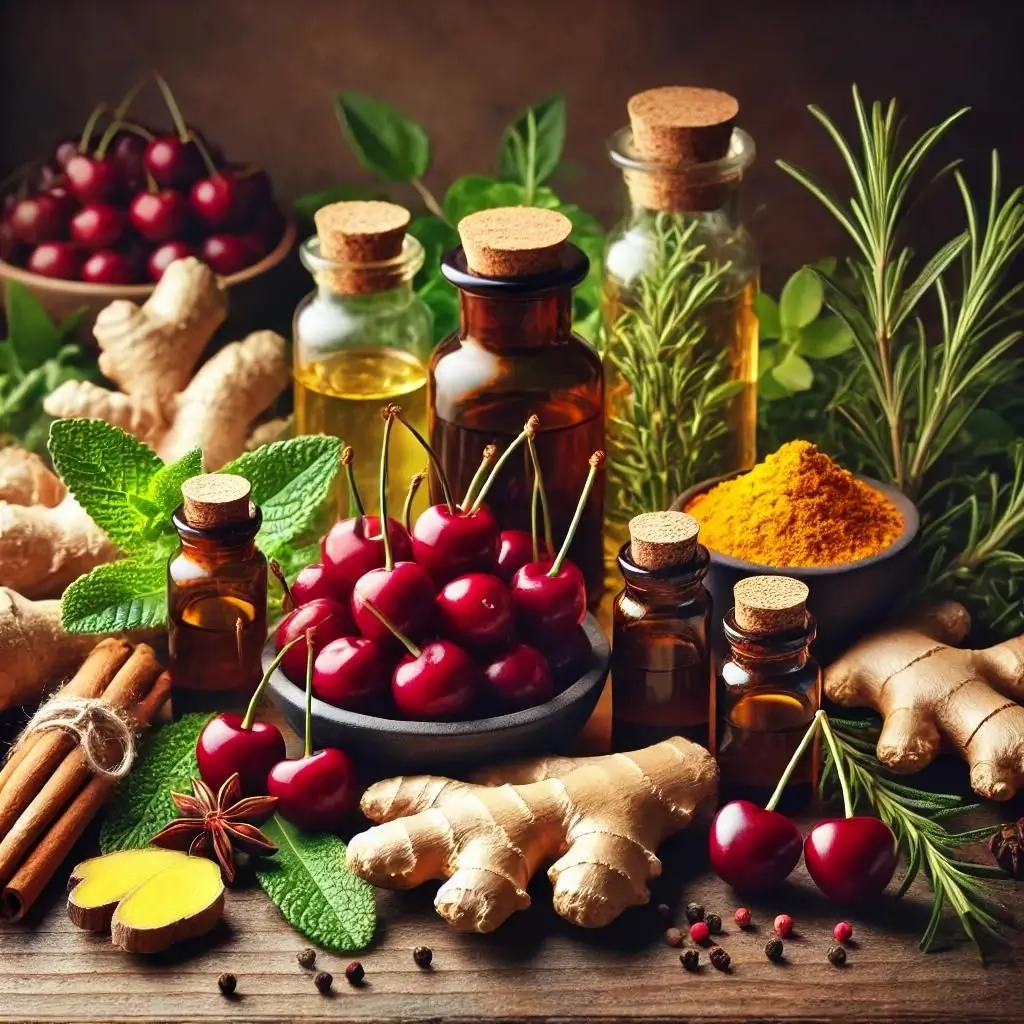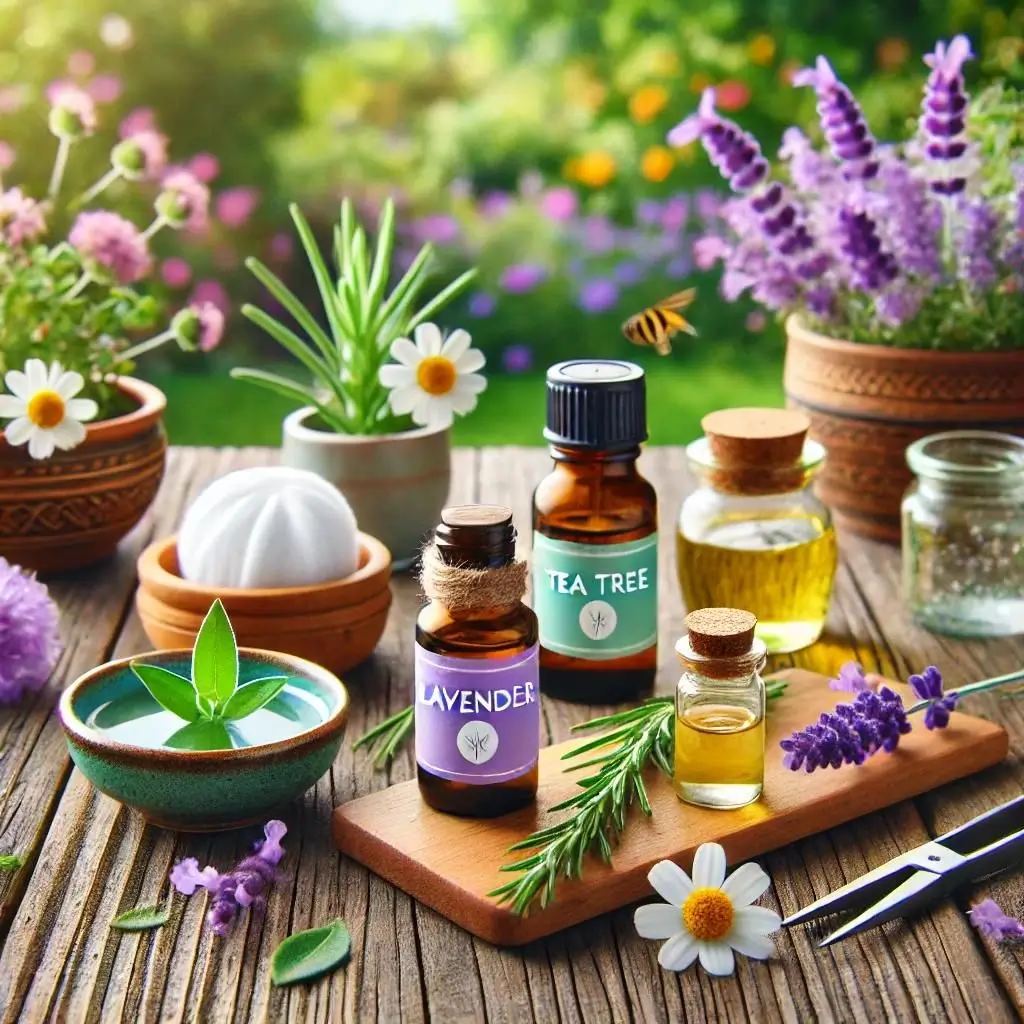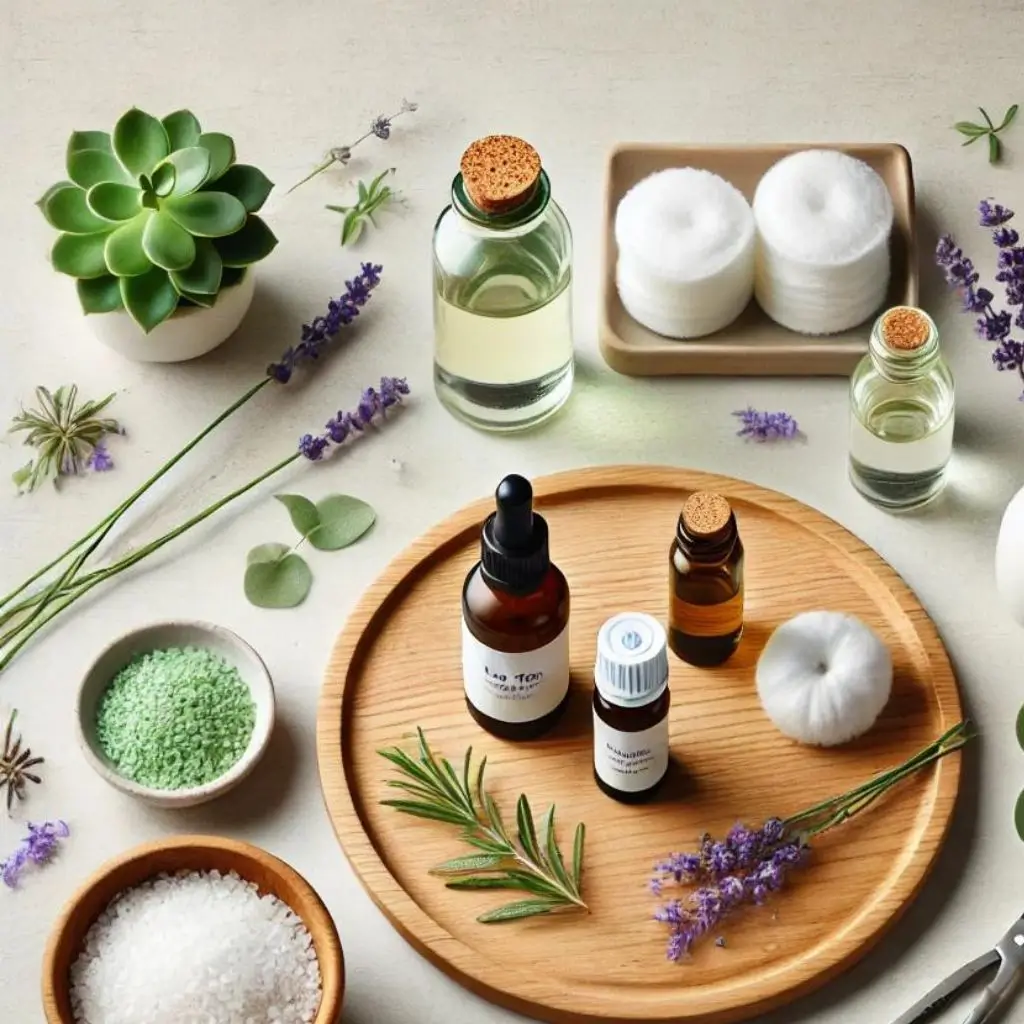Varicose veins are swollen, twisted veins that are visible just under the surface of the skin. They often occur in the legs and can cause discomfort, pain, and even more serious health issues if not managed properly. These veins result from weakened or damaged valves within the veins, which hinder proper blood flow. Essential oils, derived from plants, have been used for centuries in alternative medicine and are now gaining attention for their potential benefits in treating varicose veins.
Essential oils offer a natural alternative to support vein health by promoting circulation, reducing inflammation, and easing pain associated with varicose veins. Various essential oils, like Cypress, Lavender, and Rosemary, are reputed to have beneficial properties that can help improve the condition of varicose veins when used correctly. In this article, we will explore the most common questions about using essential oils for varicose veins, including their benefits, usage tips, safety precautions, and how they compare to other treatment options.
What essential oils are good for varicose veins?
Several essential oils are known for their properties that may benefit those suffering from varicose veins. Here’s a look at some of the most effective essential oils:
1. Cypress Essential Oil
Cypress oil is popular for its ability to increase circulation and support vein health. It contains compounds that can help strengthen the veins and reduce swelling.
2. Helichrysum Essential Oil
Known for its anti-inflammatory and antioxidant properties, Helichrysum oil can help reduce pain and improve blood flow, making it beneficial for varicose veins.
3. Lavender Essential Oil
Lavender oil is often used for its soothing and anti-inflammatory properties. It can help relieve pain and reduce swelling in the veins.
4. Rosemary Essential Oil
Rosemary oil improves circulation and reduces pain, making it an excellent choice for treating varicose veins.
5. Lemon Essential Oil
Lemon oil is rich in vitamin C and antioxidants, which can help strengthen vein walls and improve circulation.
Table: Essential Oils and Their Properties for Varicose Veins
| Essential Oil | Key Properties | Benefits for Varicose Veins |
|---|---|---|
| Cypress | Circulation booster, anti-inflammatory | Strengthens veins, reduces swelling |
| Helichrysum | Anti-inflammatory, antioxidant | Reduces pain, improves blood flow |
| Lavender | Soothing, anti-inflammatory | Relieves pain, reduces swelling |
| Rosemary | Circulation enhancer, pain reliever | Improves circulation, eases discomfort |
| Lemon | Antioxidant, vitamin C-rich | Strengthens vein walls, boosts circulation |
These essential oils can be used individually or blended to enhance their effects on varicose veins. However, it is crucial to use them safely and effectively to gain the most benefit.

How do essential oils help with varicose veins?
Essential oils can help manage varicose veins through various mechanisms, primarily by improving circulation, reducing inflammation, and alleviating discomfort. Here’s a detailed look at how essential oils can be beneficial:
- Improving Circulation: Oils like Cypress and Rosemary are known for their ability to stimulate blood flow. They help enhance the circulation of blood through the veins, which can prevent the pooling of blood and reduce pressure on the vein walls.
- Reducing Inflammation: Essential oils such as Helichrysum and Lavender contain anti-inflammatory properties that can decrease the swelling and irritation around varicose veins. This reduction in inflammation can alleviate pain and discomfort associated with the condition.
- Alleviating Pain and Discomfort: Many essential oils have analgesic (pain-relieving) properties that can soothe aching veins. Lavender, in particular, is well-known for its calming effects and can help relax muscle tension around varicose veins.
- Strengthening Vein Walls: Oils like Lemon are rich in antioxidants and vitamin C, which can strengthen vein walls and reduce the likelihood of further damage.
- Detoxifying Effects: Some essential oils can help detoxify the body, which may assist in reducing the load on the venous system and improve overall blood circulation.
- Promoting Relaxation and Stress Relief: Stress can exacerbate varicose veins, and essential oils like Lavender can promote relaxation and relieve stress, indirectly supporting vein health.
- Balancing Hormones: Some varicose veins are linked to hormonal imbalances, and essential oils such as Clary Sage can help balance hormones, reducing symptoms associated with varicose veins.
- Improving Skin Health: Oils like Frankincense can improve skin elasticity and repair, which can benefit the skin overlying varicose veins.
- Anti-aging Properties: Many essential oils help in maintaining youthful skin by boosting collagen production and protecting the skin from oxidative stress.
- Enhancing Lymphatic Drainage: Essential oils can aid in lymphatic drainage, reducing fluid retention and swelling in the affected areas.
Essential oils offer a complementary approach to managing varicose veins alongside other treatments. However, it is essential to consult with a healthcare professional before incorporating them into your treatment regimen.
How to use essential oils for varicose veins safely?
Using essential oils safely is crucial to ensure effectiveness and avoid potential side effects. Here are some guidelines for using essential oils for varicose veins:
- Dilution: Always dilute essential oils with a carrier oil before applying them to the skin. Common carrier oils include coconut oil, jojoba oil, and almond oil. A typical dilution ratio is 3-5 drops of essential oil per teaspoon of carrier oil.
- Patch Test: Conduct a patch test by applying a small amount of the diluted oil to a patch of skin, such as the inside of your wrist. Wait 24 hours to ensure no allergic reaction occurs.
- Application Method: Apply the diluted essential oil blend to the affected areas using gentle, upward strokes to promote circulation towards the heart. Avoid applying too much pressure, as this can worsen varicose veins.
- Frequency: Use essential oils consistently for the best results. Apply the blend once or twice daily as part of your skincare routine.
- Avoid Sun Exposure: Some essential oils, like lemon, can increase sensitivity to sunlight. Avoid sun exposure on treated areas for at least 12 hours after application.
- Consultation: If you have sensitive skin or underlying health conditions, consult with a healthcare professional or aromatherapist before using essential oils.
- Avoid Ingestion: Essential oils should not be ingested unless advised by a qualified healthcare provider.
- Store Properly: Keep essential oils in a cool, dark place to preserve their potency and extend their shelf life.
- Use Blends: Consider blending different essential oils to enhance their effectiveness. For example, a blend of Cypress, Lavender, and Lemon can provide comprehensive benefits for varicose veins.
- Discontinue if Irritation Occurs: If you experience any irritation or adverse reactions, discontinue use immediately and consult a healthcare professional.
By following these guidelines, you can safely incorporate essential oils into your routine to help manage varicose veins and support overall vein health.
Can essential oils reduce the appearance of varicose veins?
While essential oils cannot cure varicose veins, they can help reduce their appearance by improving circulation, decreasing inflammation, and promoting skin health. Here’s how they can make a difference:
- Improved Circulation: Essential oils like Cypress and Rosemary enhance blood flow, reducing the pooling of blood in the veins and thereby diminishing the bulging appearance of varicose veins.
- Reduced Swelling: Anti-inflammatory oils such as Helichrysum and Lavender can decrease swelling and the associated pain, leading to a less prominent appearance.
- Enhanced Skin Health: Oils rich in antioxidants, like Lemon and Frankincense, can improve skin tone and elasticity, making varicose veins less noticeable.
- Strengthened Vein Walls: The strengthening properties of essential oils, such as those found in Lemon oil, can support vein structure and reduce the likelihood of further damage or protrusion.
- Promotion of Relaxation: Oils like Lavender promote relaxation and reduce stress, which can indirectly benefit the appearance of varicose veins by improving overall circulation.
- Skin Tightening: Some essential oils help tighten the skin around varicose veins, giving them a less pronounced look.
- Detoxification: Essential oils can aid in detoxifying the skin and veins, improving overall skin health and appearance.
- Moisturizing Effects: Regular application of essential oils keeps the skin hydrated and supple, reducing the prominence of varicose veins.
- Reduction of Discoloration: Certain oils can help lighten the skin and reduce discoloration around varicose veins.
- Soothing Effects: Essential oils soothe the skin, reducing redness and irritation around varicose veins.
While essential oils can help reduce the appearance of varicose veins, it’s essential to combine their use with lifestyle changes such as regular exercise, a balanced diet, and proper hydration for the best results.
What are the best blends of essential oils for varicose veins?
Creating essential oil blends can enhance their effectiveness in managing varicose veins. Here are some of the best blends you can try:
1. Cypress and Lavender Blend
- Ingredients: 3 drops of Cypress oil, 3 drops of Lavender oil, 2 tablespoons of coconut oil.
- Benefits: Improves circulation, reduces inflammation, and soothes the skin.
2. Helichrysum and Lemon Blend
- Ingredients: 3 drops of Helichrysum oil, 3 drops of Lemon oil, 2 tablespoons of jojoba oil.
- Benefits: Enhances blood flow, strengthens vein walls, and promotes skin health.
3. Rosemary and Peppermint Blend
- Ingredients: 3 drops of Rosemary oil, 2 drops of Peppermint oil, 2 tablespoons of almond oil.
- Benefits: Boosts circulation, provides a cooling sensation, and reduces discomfort.
4. Frankincense and Geranium Blend
- Ingredients: 3 drops of Frankincense oil, 3 drops of Geranium oil, 2 tablespoons of olive oil.
- Benefits: Improves skin elasticity, reduces swelling, and promotes relaxation.
5. Lemon and Grapefruit Blend
- Ingredients: 3 drops of Lemon oil, 3 drops of Grapefruit oil, 2 tablespoons of grapeseed oil.
- Benefits: Detoxifies the skin, lightens discoloration, and strengthens vein walls.
Table: Essential Oil Blends for Varicose Veins
| Blend | Ingredients | Key Benefits |
|---|---|---|
| Cypress and Lavender | Cypress oil, Lavender oil, Coconut oil | Circulation, inflammation reduction, skin soother |
| Helichrysum and Lemon | Helichrysum oil, Lemon oil, Jojoba oil | Blood flow, vein strength, skin health |
| Rosemary and Peppermint | Rosemary oil, Peppermint oil, Almond oil | Circulation, cooling effect, discomfort reduction |
| Frankincense and Geranium | Frankincense oil, Geranium oil, Olive oil | Skin elasticity, swelling reduction, relaxation |
| Lemon and Grapefruit | Lemon oil, Grapefruit oil, Grapeseed oil | Detoxification, discoloration reduction, vein strength |
Using these blends consistently can help manage the symptoms of varicose veins and improve the appearance of affected areas. Always remember to dilute essential oils properly before use.
What are the risks of using essential oils for varicose veins?
While essential oils are natural, they come with some risks that need to be considered, especially for those with varicose veins. Here are some potential risks:
- Skin Irritation: Some individuals may experience skin irritation or allergic reactions to certain essential oils, particularly if they are used undiluted.
- Photosensitivity: Oils like Lemon and Grapefruit can cause photosensitivity, leading to sunburn if the skin is exposed to sunlight after application.
- Interactions with Medications: Essential oils can interact with certain medications, potentially altering their effects. It’s important to consult with a healthcare provider if you are taking any medications.
- Exacerbation of Symptoms: Improper use or overuse of essential oils can potentially worsen symptoms or cause new skin issues.
- Pregnancy and Breastfeeding: Some essential oils may not be safe for use during pregnancy or breastfeeding. Always consult with a healthcare professional before using essential oils if you are pregnant or nursing.
- Quality and Purity: The effectiveness and safety of essential oils depend on their quality and purity. Always choose high-quality, therapeutic-grade oils from reputable sources.
- Individual Sensitivity: Everyone’s skin reacts differently to essential oils. What works for one person may not work for another.
- Chronic Conditions: People with chronic skin conditions or vascular issues should be cautious and consult with a healthcare provider before using essential oils.
- Potential Toxicity: Some essential oils can be toxic if ingested or used in excessive amounts.
- Improper Storage: Essential oils can degrade over time or when exposed to heat and light, reducing their effectiveness and potentially leading to skin irritation.
To minimize these risks, it’s important to use essential oils safely, consult with a healthcare professional if you have any concerns, and always perform a patch test before full application.
How do essential oils compare to other varicose veins treatments?
Essential oils offer a natural and holistic approach to managing varicose veins, but how do they compare to other treatment options? Here’s a comparison:
1. Essential Oils vs. Medical Treatments
- Non-Invasive: Essential oils are non-invasive and can be used as part of a self-care routine, whereas medical treatments may involve surgery or injections.
- Cost-Effective: Essential oils are generally more affordable than medical procedures.
- Natural Approach: Essential oils provide a natural alternative without the use of chemicals or drugs.
2. Essential Oils vs. Compression Stockings
- Complementary Use: Essential oils can be used alongside compression stockings to enhance their effectiveness.
- Comfort and Convenience: Applying essential oils can be more comfortable than wearing compression stockings all day.
3. Essential Oils vs. Lifestyle Changes
- Synergistic Effects: Essential oils work best when combined with lifestyle changes such as exercise, a healthy diet, and proper hydration.
4. Essential Oils vs. Topical Creams
- Natural Ingredients: Essential oils are derived from plants and offer a natural alternative to synthetic ingredients found in some topical creams.
- Customizable: You can create personalized blends of essential oils to address specific needs.
Table: Comparison of Treatments for Varicose Veins
| Treatment Type | Pros | Cons |
|---|---|---|
| Essential Oils | Non-invasive, cost-effective, natural approach | May not provide immediate or dramatic results |
| Medical Treatments | Quick and effective results, addresses underlying issues | Invasive, expensive, potential side effects |
| Compression Stockings | Improve circulation, reduce swelling | May be uncomfortable, require consistent use |
| Lifestyle Changes | Support overall health, improve circulation | Require commitment and time |
| Topical Creams | Easy to apply, provide quick relief | May contain synthetic ingredients, limited effectiveness |
While essential oils offer a gentle and natural approach, they may not provide immediate or dramatic results like medical treatments. However, they can be a valuable part of a comprehensive approach to managing varicose veins.
Can essential oils prevent varicose veins?
While essential oils cannot entirely prevent varicose veins, they can play a role in reducing the risk factors associated with their development. Here’s how essential oils can help in prevention:
- Improving Circulation: Essential oils like Cypress and Rosemary can enhance blood flow, reducing the risk of vein damage and varicose veins.
- Strengthening Vein Walls: Oils rich in antioxidants, such as Lemon and Helichrysum, can strengthen vein walls, making them less susceptible to damage.
- Reducing Inflammation: Anti-inflammatory oils like Lavender can decrease swelling and pressure on the veins, helping prevent varicose veins from forming.
- Promoting Relaxation and Stress Relief: Stress can contribute to circulatory issues. Essential oils like Lavender and Frankincense can promote relaxation and reduce stress, supporting overall vein health.
- Enhancing Skin Health: Essential oils can improve skin elasticity and resilience, reducing the risk of visible varicose veins.
- Encouraging Lymphatic Drainage: Oils that aid in lymphatic drainage can reduce fluid retention, decreasing the burden on the veins.
- Balancing Hormones: Hormonal imbalances can contribute to varicose veins. Oils like Clary Sage can help balance hormones and reduce risk factors.
- Supporting Weight Management: Some essential oils can aid in weight management, reducing pressure on the veins.
- Encouraging a Healthy Lifestyle: Incorporating essential oils into a daily routine can complement other healthy lifestyle practices that support vein health.
- Detoxifying Effects: Essential oils can help detoxify the body, improving circulation and vein health.
While essential oils can support vein health and reduce risk factors, it is important to combine their use with lifestyle changes, such as regular exercise and a balanced diet, to effectively prevent varicose veins.
What lifestyle changes can support the use of essential oils for varicose veins?
Combining essential oils with lifestyle changes can enhance their effectiveness in managing varicose veins. Here are some lifestyle changes that can support the use of essential oils:
- Regular Exercise: Engaging in regular physical activity, such as walking, swimming, or cycling, can improve circulation and reduce the risk of varicose veins.
- Healthy Diet: Eating a balanced diet rich in fruits, vegetables, whole grains, and lean proteins can support vein health and reduce inflammation.
- Staying Hydrated: Drinking plenty of water helps maintain healthy blood flow and prevent dehydration, which can contribute to vein issues.
- Weight Management: Maintaining a healthy weight reduces pressure on the veins and decreases the risk of varicose veins.
- Elevating Legs: Elevating your legs periodically throughout the day can improve circulation and reduce swelling.
- Avoiding Prolonged Sitting or Standing: Taking breaks to move and stretch if you sit or stand for long periods can prevent blood from pooling in the veins.
- Wearing Compression Stockings: Compression stockings can improve circulation and reduce swelling when used in conjunction with essential oils.
- Avoiding Tight Clothing: Wearing loose-fitting clothing can promote healthy blood flow and prevent constriction of the veins.
- Reducing Stress: Practicing stress-reducing techniques such as yoga, meditation, or deep breathing can support vein health and overall well-being.
- Avoiding High Heels: Wearing flat or low-heeled shoes can reduce strain on the veins and improve circulation.
Incorporating these lifestyle changes can enhance the benefits of essential oils and contribute to healthier veins and overall well-being.
How long does it take to see results from using essential oils on varicose veins?
The time it takes to see results from using essential oils on varicose veins can vary based on several factors. Here’s what you can expect:
- Consistency: Consistent use of essential oils is key to seeing results. Applying oils regularly as part of your skincare routine can enhance their effectiveness.
- Severity of Varicose Veins: The severity of your varicose veins can impact how quickly you see results. More severe cases may require more time and additional treatments.
- Combination with Lifestyle Changes: Combining essential oils with lifestyle changes, such as exercise and a healthy diet, can accelerate results.
- Individual Response: Each individual’s response to essential oils can vary. Some people may see improvements within a few weeks, while others may take longer.
- Type of Essential Oils Used: The specific essential oils and blends used can also influence the time it takes to see results.
- Quality of Essential Oils: Using high-quality, therapeutic-grade essential oils can enhance the likelihood of seeing results.
- Application Method: Proper application techniques, such as gentle massage with upward strokes, can improve the effectiveness of essential oils.
- Underlying Health Conditions: Any underlying health conditions can impact the time it takes to see results. Consulting with a healthcare professional can provide personalized guidance.
- Patience and Persistence: It’s important to be patient and persistent with the use of essential oils, as natural remedies often take time to show results.
- Monitoring Progress: Keeping track of your progress can help you assess the effectiveness of essential oils and make any necessary adjustments.
While essential oils can provide benefits for varicose veins, they are not a quick fix. Consistent use, combined with a healthy lifestyle, is key to achieving the best results.
Conclusion
Essential oils offer a natural and holistic approach to managing varicose veins. By improving circulation, reducing inflammation, and promoting skin health, essential oils can help alleviate the symptoms and reduce the appearance of varicose veins. While they are not a cure, they can be a valuable part of a comprehensive approach to vein health.
When using essential oils, it is important to prioritize safety, consult with a healthcare professional if necessary, and combine their use with lifestyle changes for the best results. With consistent use and proper care, essential oils can support healthier veins and overall well-being.



